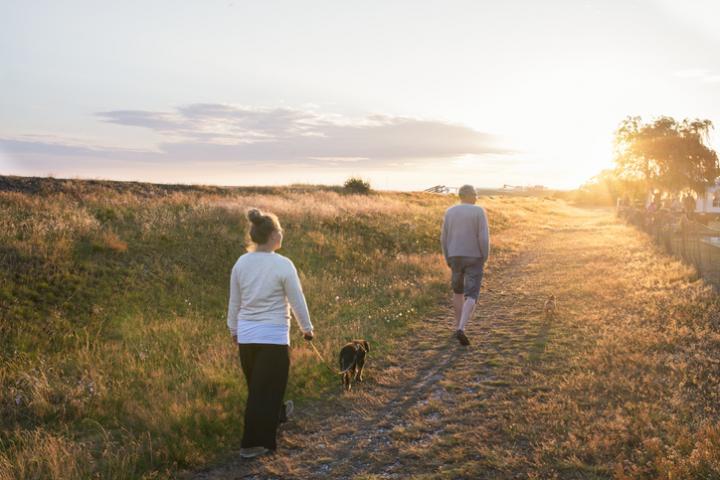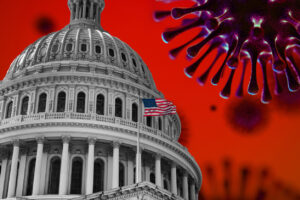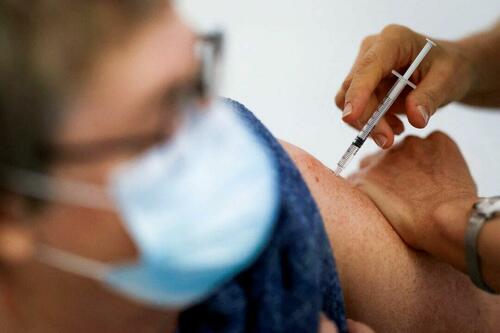SLOW walkers are almost four times more likely to die from COVID-19, and have over twice the risk of contracting a severe version of the virus, according to a team of researchers from the National Institute for Health Research (NIHR) Leicester Biomedical Research Centre led by Professor Tom Yates at the University of Leicester.
The study of 412,596 middle-aged UK Biobank participants examined the relative association of body mass index (BMI) and self-reported walking pace with the risk of contracting severe COVID-19 and COVID-19 mortality.
The analysis found slow walkers of a normal weight to be almost 2.5 times more likely to develop severe COVID-19 and 3.75 times more likely to die from the virus than normal weight fast walkers. (1)
Professor Yates, Lead Researcher for the study and a Professor of Physical Activity, Sedentary Behaviour and Health at the University of Leicester said:-
“We know already that obesity and frailty are key risk factors for COVID-19 outcomes. This is the first study to show that slow walkers have a much higher risk of contracting severe COVID-19 outcomes, irrespective of their weight.
“With the pandemic continuing to put unprecedented strain on health care services and communities, identifying individuals at greatest risk and taking preventative measures to protect them is crucial.”
A further key finding from this research was that normal weight slow walkers are more at risk for both severe COVID-19 and COVID-19 mortality than fast walkers with obesity. Furthermore, risk was uniformly high in normal weight slow walkers and slow walkers with obesity.
Professor Yates continued:-
“Fast walkers have been shown to generally have good cardiovascular and heart health, making them more resilient to external stressors, including viral infection but this hypothesis has not yet been established for infectious disease.
“Whilst large routine database studies have reported the association of obesity and fragility with COVID-19 outcomes, routine clinical databases do not currently have data on measures of physical function or fitness.
“It is my view that ongoing public health and research surveillance studies should consider incorporating simple measures of physical fitness such as self-reported walking pace in addition to BMI, as potential risk predictors of COVID-19 outcomes that could ultimately enable better prevention methods that save lives.”
###
The study ‘Obesity, walking pace and risk of severe COVID-19 and mortality: analysis of UK Biobank’ was published on 26 February 2021 in the International Journal of Obesity. The analysis was restricted to England and outcomes were assessed during the first wave of the pandemic.
Notes to Editors
For more information please contact Corinne Scotland, Senior Media Officer at the University of Leicester, on cjs78@leicester.ac.uk/ 07590403166.
To contact the NIHR Leicester Biomedical Research Centre please contact Rachael Dowling, Communications Lead, on Rachael.dowling@uhl-tr.nhs.uk/ 07950891193
(1) BMI was categorised as normal weight (18.5-24.9kg/m2), overweight (25-29.9kg/m2), and obese (?30kg/m2). Underweight individuals (BMI
Habitual walking pace was self-reported as slow (4 mph).
This research was supported by the National Institute for Health Research (NIHR) Leicester Biomedical Research Centre, the NIHR Applied Research Collaboration – East Midlands, and a grant from the UKRI-DHSC COVID-19 Rapid Response Rolling Call (MR/V020536/1). T
The University of Leicester
The University of Leicester is led by discovery and innovation. It is an international centre for excellence renowned for research, teaching and broadening access to higher education.
It is among the top 25 universities in the Times Higher Education REF Research Power rankings with 75% of research adjudged to be internationally excellent with wide-ranging impacts on society, health, culture, and the environment.
The University is home to just over 20,000 students and approximately 4,000 staff. Find out more: https:/
The NIHR Leicester Biomedical Research Centre
The National Institute for Health Research (NIHR) Leicester Biomedical Research Centre (BRC) is a partnership between University Hospitals of Leicester NHS Trust, the University of Leicester and Loughborough University. It is funded by the National Institute for Health Research (NIHR).
The NIHR Leicester BRC undertakes translational clinical research in priority areas of high disease burden and clinical need. These include cardiovascular disease, respiratory disease, and lifestyle, obesity and physical activity. There is also a cross-cutting theme for precision medicine. The BRC harnesses the power of experimental science to explore and develop ways to help prevent and treat chronic disease. It brings together 70 highly skilled researchers, 30 of which are at the forefront of clinical services delivery. By having scientists working closely with clinicians, the BRC can deliver research that is relevant to patients and the professionals who treat them.
http://www.
The National Institute for Health Research (NIHR) is the nation’s largest funder of health and care research.
The NIHR:
- Funds, supports and delivers high quality research that benefits the NHS, public health and social care
- Engages and involves patients, carers and the public in order to improve the reach, quality and impact of research
- Attracts, trains and supports the best researchers to tackle the complex health and care challenges of the future
- Invests in world-class infrastructure and a skilled delivery workforce to translate discoveries into improved treatments and services
- Partners with other public funders, charities and industry to maximise the value of research to patients and the economy
The NIHR was established in 2006 to improve the health and wealth of the nation through research, and is funded by the Department of Health and Social Care. In addition to its national role, the NIHR supports applied health research for the direct and primary benefit of people in low- and middle-income countries, using UK aid from the UK government.
This work uses data provided by patients and collected by the NHS as part of their care and support and would not have been possible without access to this data. The NIHR recognises and values the role of patient data, securely accessed and stored, both in underpinning and leading to improvements in research and care.
http://www.











































